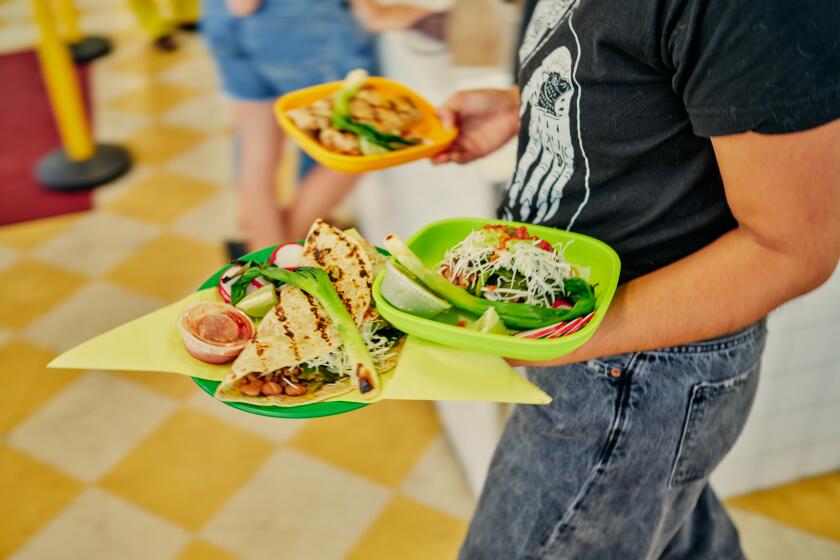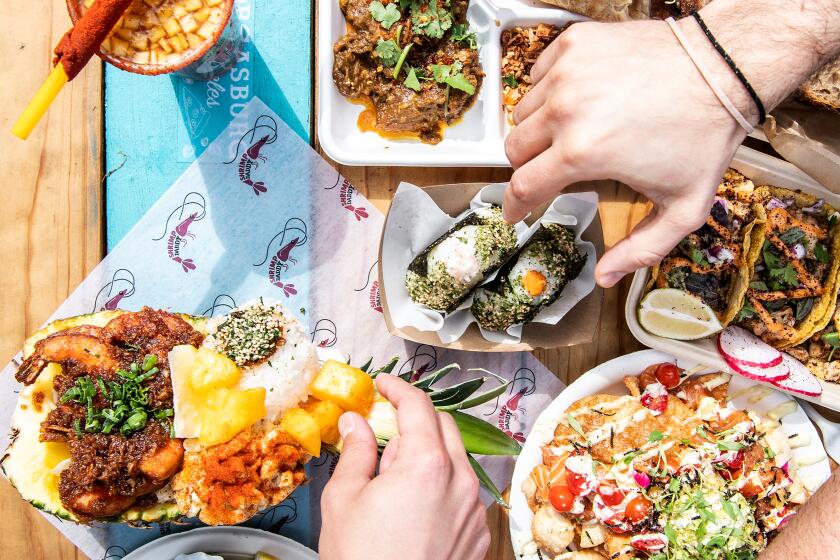Want to save money, curb food waste and try new restaurants? There’s an app for that.
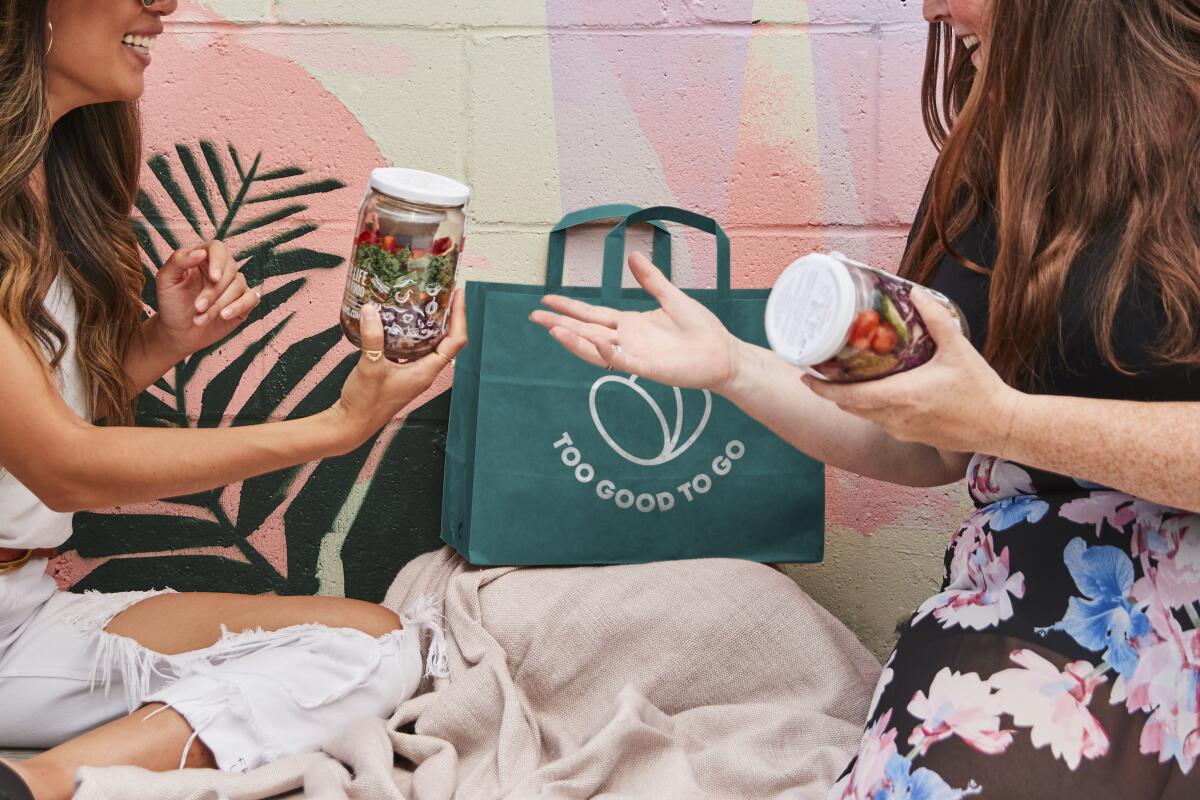
Last week, I saved $59 and helped reduce food waste from five L.A. restaurants by eating pastries, Chinese food and lasagna. I also drank two cups of boba tea.
For two days, I left my breakfast, lunch and dinner up to an app called Too Good to Go. It’s a Danish company that aims to put surplus food and beverages destined for the trash into the hands of diners at discounted prices. The only catch? You don’t know what you’re getting, until you pick it up.
Stretch your dollar further with affordable and delicious meals for under $15, including Sonora-style burritos, burgers, Vietnamese comfort food, Salvadoran cuisine and more.
There are upward of 1,400 participating stores in the Los Angeles area. Just last week, Whole Foods appeared on the app with prepared meals and bakery items from the grocery chain.
Each morning, I opened the app and browsed the available selections in my area. There were dozens of doughnuts and pastries from bakeries and coffee shops. Many were from recognizable chains such as Coffee Bean & Tea Leaf and Krispy Kreme, with a few smaller businesses in the mix.
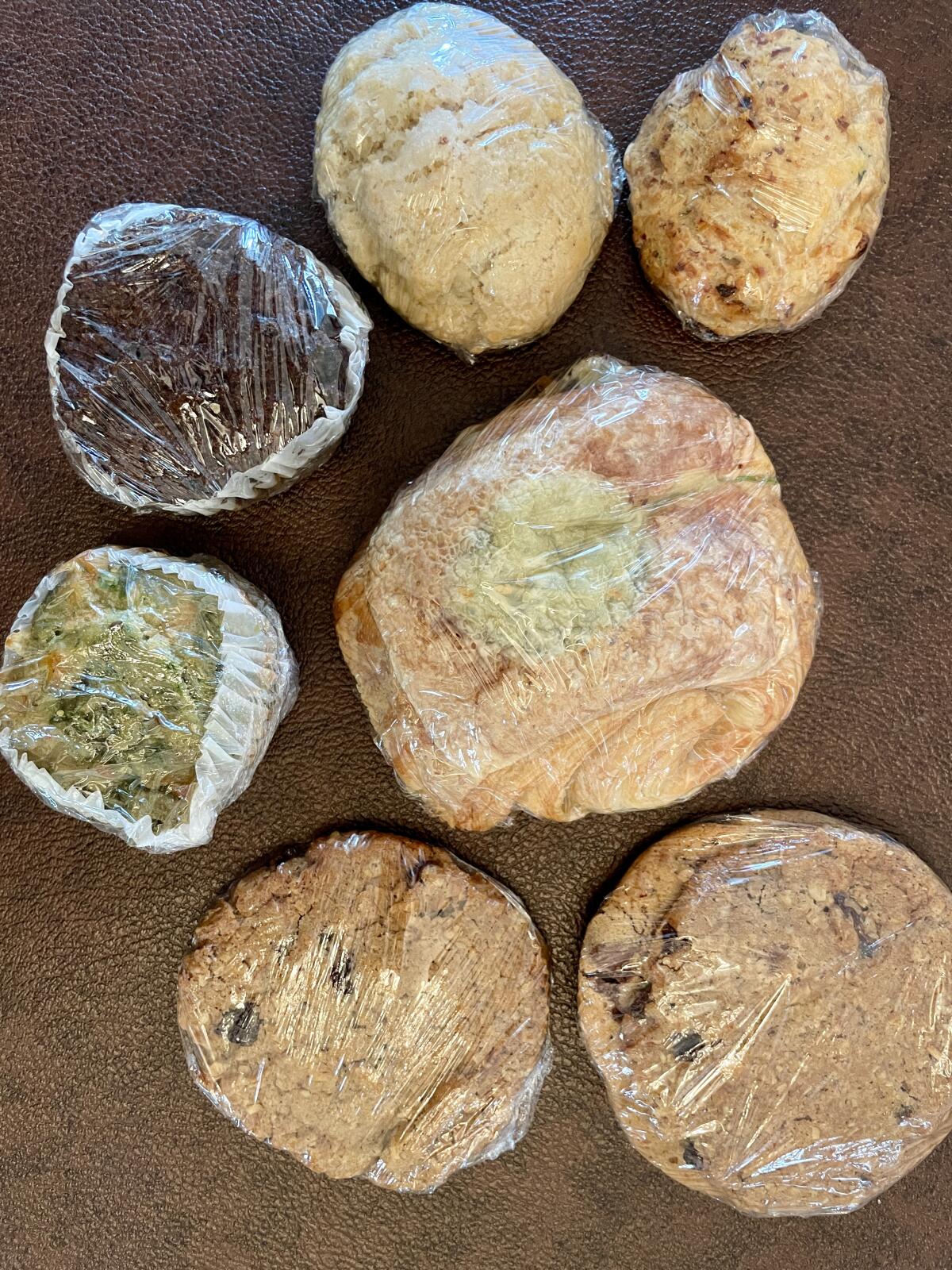
Prices range from $4.99 to $9.99. There’s no fee, and you pre-pay for what you order. Descriptions of the offerings are limited, with many places not knowing what they’ll be able to sell until the morning of. It can be tricky to navigate if you have a food allergy or any other dietary restrictions. You can filter for vegetarian and plant-based items, but depending on your location, the offerings can be limited.
For each store, there’s a pickup window, a price, an original value and a star rating.
“Our goal is to be everywhere, at every store near you,” Too Good to Go spokesperson Sarah Soteroff said on a recent call. “It’s important for us to save food from everywhere, from every convenience store to high-end grocery, local coffee shop or big chain.”
Too Good to Go started in Copenhagen in 2016, expanded throughout Europe, into Canada and then to the U.S. It launched in Los Angeles in 2022. Later this year, it will be in Australia.
I ordered five surprise bags over two days and spent a total of $23.96.
“The average bag should be around one-third off the retail cost,” Soteroff said. “The store determines the price, but that’s the general rule of thumb.”
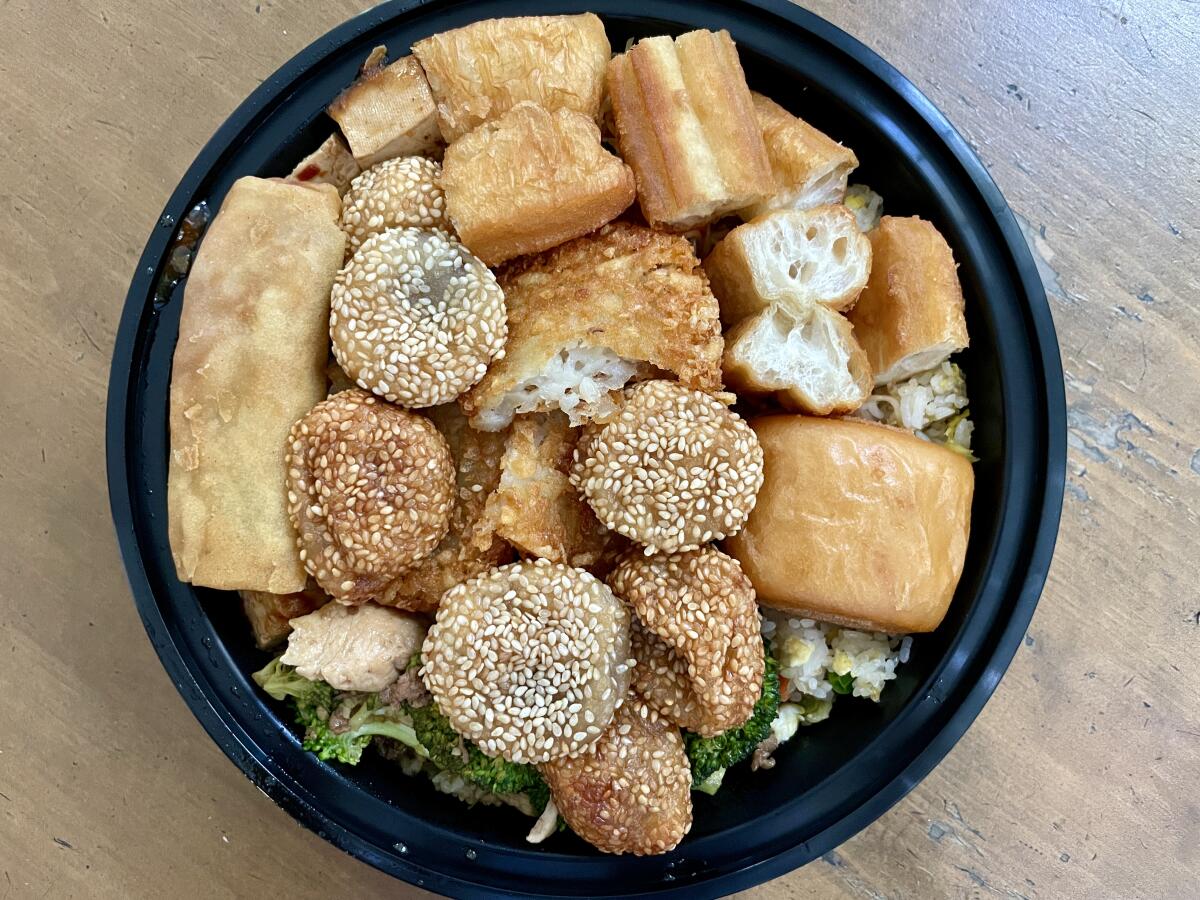
At Heirloom Bakery & Cafe in South Pasadena, I was handed a white paper bag that felt like it weighed a few pounds. I pre-paid $5.99 for the mystery bag, listed on the app with an original value of $18.
Too self conscious to open the bag while still in the shop, I waited until I got into my car to rip it open. There were three cookies, two muffins, two scones and a croissant inside. It was enough for breakfast, a snack and dessert for the entire week.
Owner Sally Cook has been selling surprise bags on the app since March 2023. She prepares four bags each weekday, and five a day over the weekend. It’s a mix of day-old pastries that she used to sell on the counter for a discounted price, same-day breads, bakes that may have not come out aesthetically perfect for whatever reason and surplus from events.
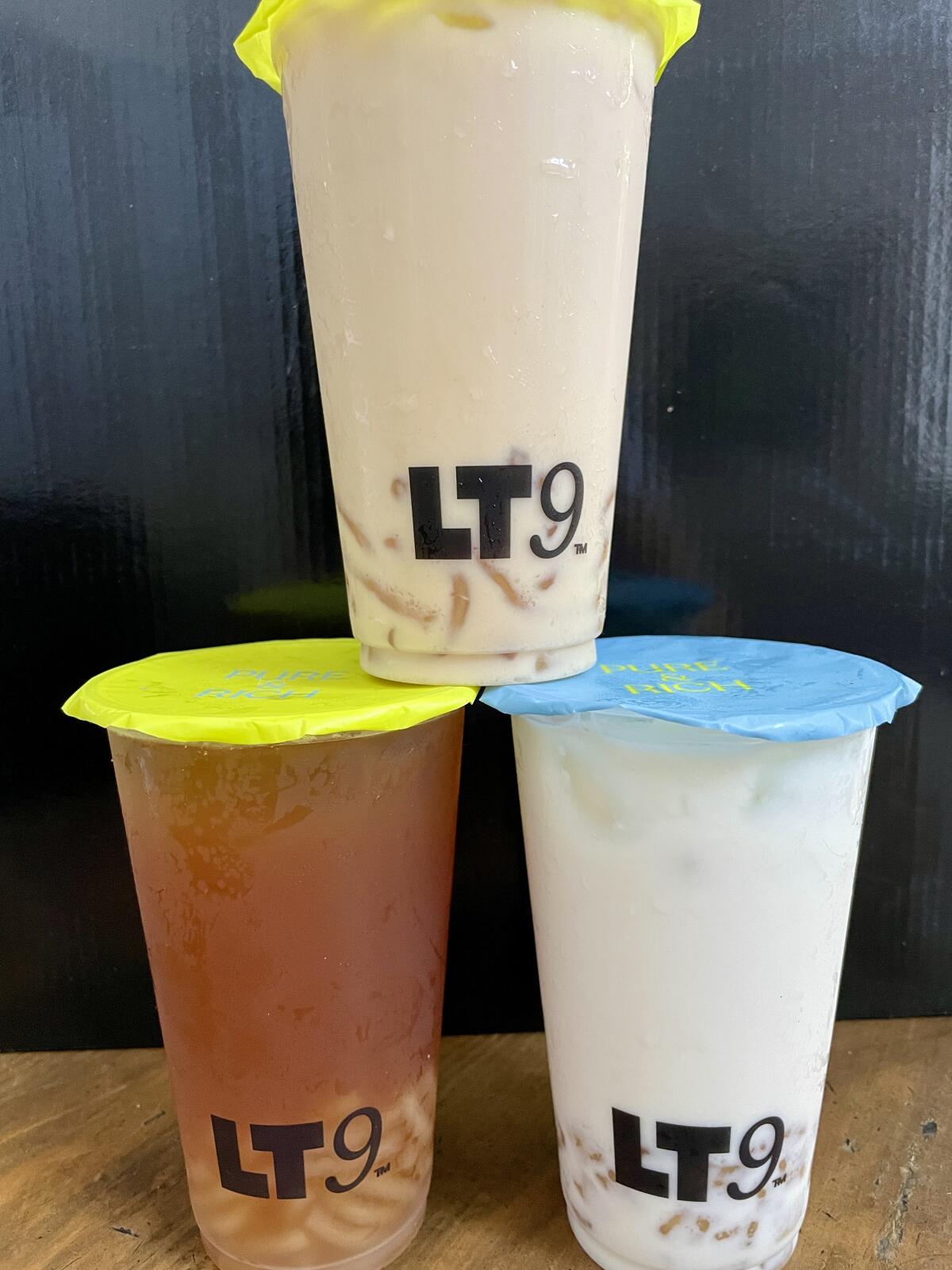
“It’s nominal business,” Cook said on a recent call. “There is a fee, but it’s something I wasn’t making money on anyways. Everyone’s business margins are shrinking, and it’s really nice to have a little extra coming in.”
Restaurants pay a $1.79 fee to the app on all transactions, regardless of the cost of your order. For Cook, the quarterly check she receives and the reduction in food waste are enough to keep her on the app.
She’s also noticed a new pool of customers, with some becoming regulars after purchasing surprise bags.
“It’s a nice way for someone to try some things out without spending a lot of money,” she said. “We’re pretty generous with what’s in the bags, and usually put a little more than the calculated value.”
Looking for something that more resembled a full meal, I purchased a $4.99 surprise lunch from Happy Ayce Hot Pot in Rosemead, with an original price of $15. The woman who greeted me at the door already had my food in hand. It was a single plastic to-go container, piping hot and with what looked like chopped youtiao (fried dough) about to burst from the lid. This time, I asked the woman who handed me the food if she knew what was in the container. She shrugged, then walked back into the kitchen.
I held on to the element of surprise until I got home. If it was indeed a container full of Chinese doughnuts, I wouldn’t be disappointed. When I removed the lid, I found enough food for at least two, with a heap of chicken fried rice, stir fried noodles, tofu in a brown gravy and beef and broccoli all piled under the youtiao, an egg roll, fried red bean sesame balls and hash browns.
In need of an afternoon pick-me-up, I searched the app for a caffeinated beverage. LT9 boba tea shop in Old Pasadena, a place I’d been meaning to try for weeks now, came up on the app with a surprise bag of boba for $6.99, and an original value of $21.
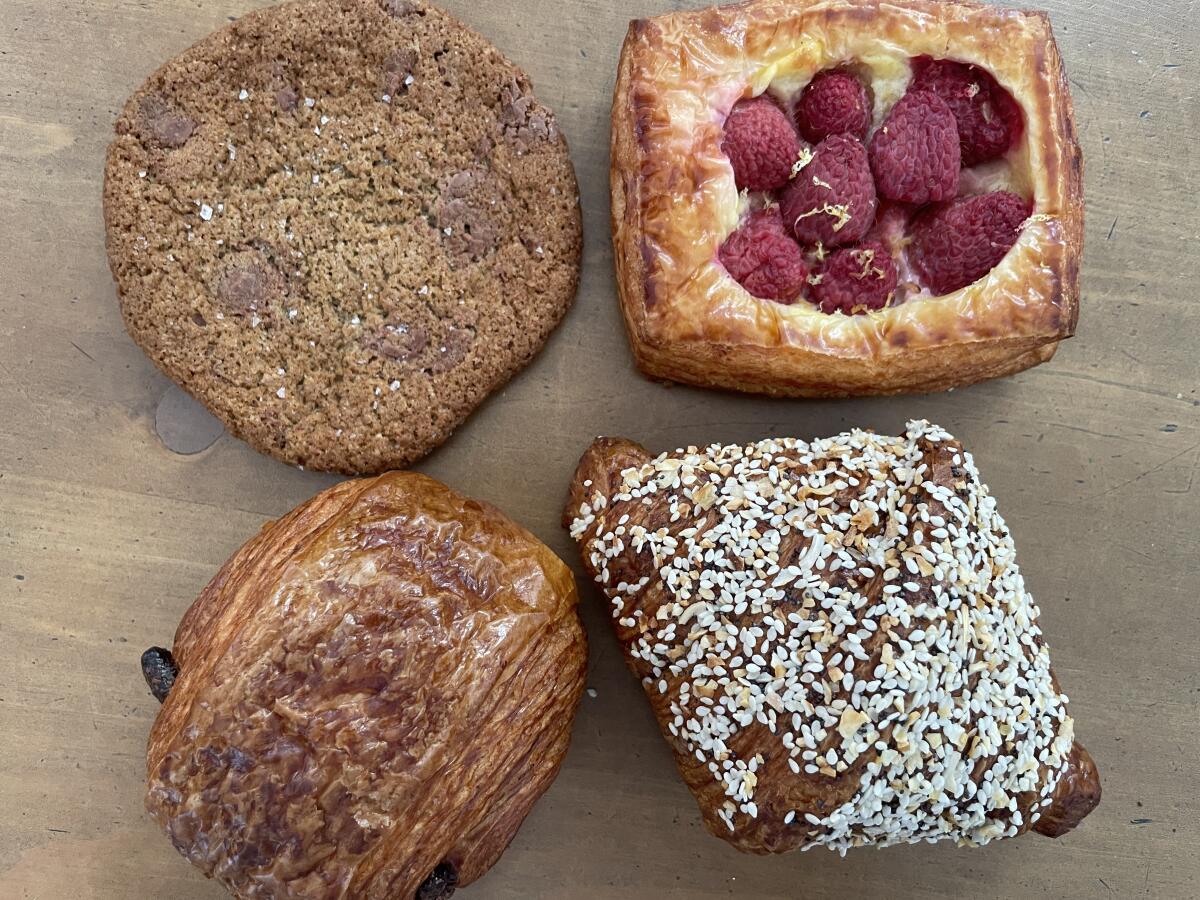
I waited about 10 minutes for my three drinks, including a noncaffeinated winter melon tea with boba cubes, a Ceylon black milk tea with squishy boba noodles and an oolong milk tea with more of the same noodles.
The shop has been on the app for about a month and offers boba bags and surprise bags of food as well. The woman at the counter told me that the selection varies each day based on what the shop wants customers to try but that there’s usually boba in each of the drinks to help curb the shop’s main food waste. After the boba is prepared, it sits for a maximum of four hours before it’s thrown away.
“It gets too stiff, and then we have to toss it,” the woman at the counter said.
Breakfast the next morning was a $5.99 bag of pastries from Blue Bottle Coffee. I couldn’t wait for the surprise, but the thrill of a deal was even more exciting. I grew up in a household that cut coupons. Nothing hits quite like saving money.
Explore the most affordable options from The Times’ 101 best restaurants list, including Salvadoran pupusas, Oaxacan tlayudas, Korean banchan and more.
Inside the bag was a chocolate croissant, a regular croissant, a cheese danish and a cookie. I decided to price out the items on the website. Before tax and tip, the total should have been $22.40.
Lunch was leftover Chinese food and a cookie. Dinner would be a $5.99 surprise from Flintridge Pizza Kitchen in La Cañada Flintridge.
While I waited for my order, I noticed the woman next to me on the app.
“Too Good to Go?” I asked. She nodded enthusiastically.
La Cañada Flintridge resident Jaclyn Barulich signed up for the app last year but she’s used it only a handful of times.
“A couple of my orders have been canceled,” she said. “This place is usually sold out so when I saw it available I grabbed it.”
She used the app to try a new bakery up the street. She told me about the whole loaf of bread she got at one restaurant and the sandwiches from another.
“It’s just nice to see food that’s not wasted,” she said. “That’s the reason I downloaded it. And I wouldn’t have known about that bakery if it weren’t for the app too.”
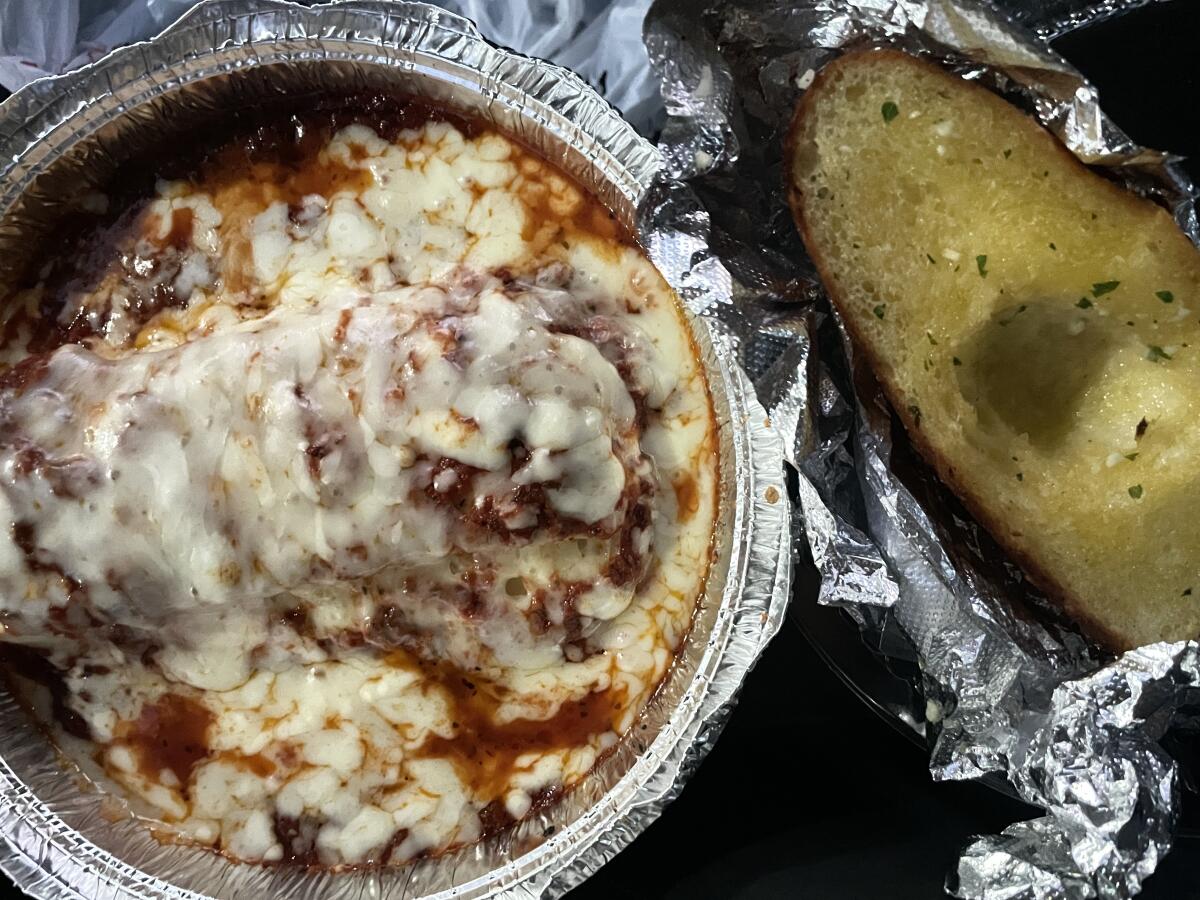
Our identical surprise meals ended up being a slab of lasagna and a slice of garlic bread. We paid $5.99. The lasagna plate is listed on the restaurant menu at $15.99.
Soteroff said Too Good to Go equates each surprise bag with a meal, though I’d argue what’s in each bag is enough for two or more. Using that metric, the company claims to have saved 13 million meals nationwide from waste. In Los Angeles, that number is 1 million.
“We saved consumers around $9 million on food they would have otherwise paid full price for,” she said, referencing the app’s presence in Los Angeles. “And we helped our partners earn $3 million on items they would have otherwise thrown away.”
More to Read
Eat your way across L.A.
Get our weekly Tasting Notes newsletter for reviews, news and more.
You may occasionally receive promotional content from the Los Angeles Times.
